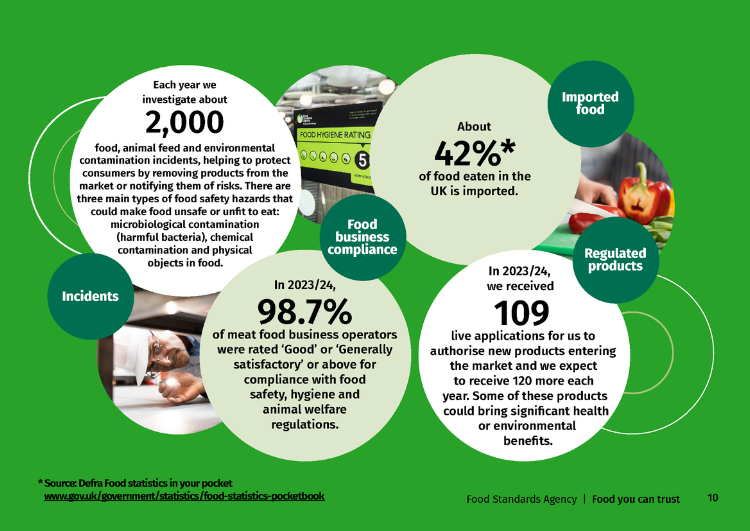What we do
From policy making to evidence generating and regulating, here’s what we do to keep food safe.
We are an evidence generator
We have a global reputation for science and research. From the rapid assessment of risks to consumer safety, to developing new surveillance techniques to identify risks more quickly, to understanding consumer values, attitudes and behaviours.
We publish our evidence in line with our commitment to transparency. This means it is freely available to others making policy and decisions, to inform guidance to businesses and so the public can understand the basis for our decisions.
We are also responsible for designating the official laboratories that carry out important chemical and compositional analyses on food and feed samples taken by local authorities or port health authorities.
We are a policymaker
We advise ministers on food safety, food authenticity and consumer interests in relation to food in England, Wales and Northern Ireland. The policy areas we advise on are different in each nation (see section: The food regulatory system). Our advice is based on science and evidence.
We support the government’s work on trade opportunities for the UK, by providing risk assessments of countries that want to start importing to the UK and demonstrating our own food safety arrangements to countries we export to. We provide policy advice to support delivery of effective and risk-based official controls – these are inspections, audits and surveillance, sampling in food businesses.
We provide policy advice to ministers on our statutory regimes for pre-market authorisations for new food and feed products, ensuring they continue to keep people safe first and foremost, while also providing an effective service to businesses and removing barriers to innovation. We are developing a new regulatory regime for precision bred food and feed and preparing for implementation. (Precision breeding describes a range of genetic techniques that can alter the DNA of plants (and animals) in a quicker and more precise way but resulting in outcomes that could have been achieved using traditional methods).
We contribute to the development of the Windsor Framework policy and implementation whilst managing the operational implications on Northern Ireland consumers. We inform cross-government work to develop and implement policy on import controls and ensure food and feed standards are improved or maintained.

We are a regulator
We regulate the food system in England, Wales and Northern Ireland. We directly deliver controls in meat, primary dairy and wine production, and oversee the delivery of controls in other parts of the food system.
FSA staff and veterinary contractors inspect, audit and assure businesses, including the signing of export health certificates. We work with local authorities who inspect local businesses selling food – setting the inspection framework, providing advice and guidance, and monitoring their performance. We do the same for port health authorities, who inspect food imports. We are reforming the food safety regulatory framework to deliver more proportionate and risk-based assurance.
We assess which new types of food and feed products should be authorised for sale on the market in Great Britain and advise on the implications of regulatory changes in Northern Ireland. We, with Food Standards Scotland, carry out risk analysis for these regulated products and provide advice to ministers, who decide whether the product can be placed on the market in England, Wales and Scotland.
We provide guidance to food businesses. We use surveillance to identify risks to consumers and spot potential food safety incidents, and we respond to these when they happen. This includes working with manufacturers, retailers and local authorities to trace sources of outbreaks of foodborne disease and co-ordinate action such as product recalls to protect consumers and businesses. Our National Food Crime Unit works to tackle serious fraud and related criminality in food supply chains.
We are a watchdog
We review and report on food standards and consumer interests in relation to food, using horizon scanning, intelligence and surveillance. We, with Food Standards Scotland, publish an annual review of food standards across the UK.
We speak out publicly about areas of consumer interest, when we have evidence or expertise that could make a difference. This includes providing advice to ministers on whether Free Trade Agreements maintain statutory protections for human health to support reports produced for the UK Parliament under Section 42 of the Agriculture Act 2020, and separately we provide advice to ministers on requests to access our markets for specific commodities.
We are a convenor and collaborator
Food is a devolved matter. We work closely with other departments in UK Government, the Welsh Government and the Northern Ireland Executive, and with Food Standards Scotland, to deliver shared priorities and ensure consumer interests in food are represented.
We are committed to cross government working to seek consensus on the advice we provide to ministers in each country. This includes participating in Common Frameworks – these are cross government processes that ensure a common approach is taken in devolved policy areas.
We also bring together other parties to address issues in the food system, working with academia, civil society and businesses to support shared goals and objectives. We share insights and evidence on the interests of citizens to help inform thinking across government.
See Our Partnerships for more information about how we work with others.
Revision log
Published: 7 October 2020
Last updated: 2 January 2025